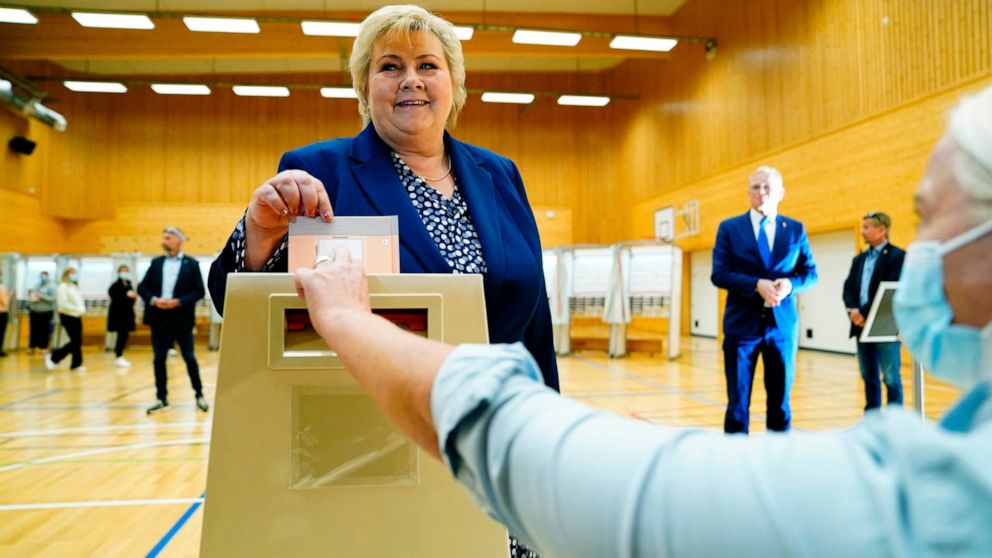Norway’s center-left heads to victory in general elections
COPENHAGEN, Denmark — The center-left bloc headed to a victory in Norway’s elections Monday as official projections pointed to the governing Conservatives losing power after a campaign dominated by climate change and the future of the country’s oil and gas exploration industry.
With a projection based on a preliminary count of nearly 93% of the votes, the Labor Party and its two allies — the Socialist Left and the euroskeptic Center Party — would hold 100 seats in the 169-seat Stortinget assembly while the current government would get 68. One seat was still unsure.
As Norway’s largest party, Labor will try to form a coalition government and its chief, 61-year-old Jonas Gahr Stoere, is poised to become Norway’s next leader. The Scandinavian country is not a member of the European Union.
“We will now give Norway a new government and a new course,” Gahr Stoere said on a election night before cheering party members who chanted “Stoere” and clapped. He added that he will in the coming days invite the parties “that want a new change” for talks.
Labor has promised an industrial policy that will funnel support to new green industries, like wind power, “blue hydrogen” that uses natural gas to produce an alternative fuel, and carbon capture and storage, which seeks to bury carbon dioxide under the ocean.
In the 2013 election, Labor was ousted from power, enabling the Conservatives’ Erna Solberg to become prime minister and Norway’s longest-serving leader. Gahr Stoere said Monday that he also wanted to thank Solberg for having been “a good prime minister.”
“We knew we needed a miracle —-the Conservatives’ work session is over,” said Solberg. “I congratulate Jonas Gahr Stoere with what looks like a clear majority.”
Her Conservatives suffered a setback, losing 4.7 percentage points which was dubbed by Norwegian broadcaster NRK as “the election’s biggest loser.” Its former coalition partner, the Progress Party lost 3.4 percentage points, according to a preliminary counting of more than 93% of the votes by Norway’s election commission.
The 60-year-old Solberg has been ahead of a minority government since 2020 — before then it was coalitions with, among others, the populist Progress Party. Due to her long tenure, as well as her commitment to economic liberalism, she became known at home as “Iron Erna” — inspired by the late British Prime Minister Margaret Thatcher who was nicknamed “The Iron Lady” for her firm style.
Solberg was hoping to become the first prime minister to win a third consecutive four-year term. During her eight-year tenure, she has expanded oil exploration, cut taxes and sought to make public administration more efficient.
Any post-election horse trading is likely to be fraught for the Labor Party and Gahr Stoere. The Socialist Left won’t offer its support lightly and the Center Party is also demanding a more aggressive approach toward shifting to renewable energy.
The Center Party made the largest gains in the election by grabbing nearly 14% of the votes — a 3.6 percentage point hike — with its leader Trygve Slagsvold Vedum, a farmer-turned-politician, noting with a large smile that it had become the third largest group in Stortinget after Labor and the Conservatives.
The campaign focused on the North Sea oil and gas that has helped make Norway one of the world’s wealthiest countries. But fears about climate change have put the future of the industry in doubt. The country’s biggest industry is responsible for over 40% of exports and directly employs more than 5% of the workforce.
On the other hand, Norwegians are among the most climate-conscious consumers in the world, with most new car purchases now being electric.
Most of Norway’s oil and gas still comes from mature areas in the North Sea, but most of the country’s untapped reserves are in the Barents Sea, above the Arctic Circle. That is a red line for environmentalists, who could play a crucial role in securing a majority government.
Gahr Stoere is a former civil servant who was elected to the Stortinget in 2009. He also owns a large part of his family’s company, and most the fortune there comes from the sale in 1977 of a Norwegian company that made cast iron stoves and fireplaces.
Stoere also served as foreign minister from 2005-2013 under then-Prime Minister Jens Stoltenberg and took over the reins of the party when Stoltenberg became NATO’s secretary general.
Nearly 3.9 million Norwegians were eligible to vote and more than 1.6 million of them voted in advance, according to Norway’s election commission. Turnout was 76.3%, down from more than 78% in this nation of 5.3 million voted.
———
Follow all AP stories on climate change at https://apnews.com/hub/Climate.
![]()


